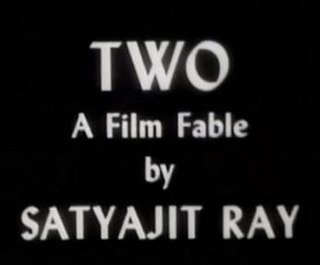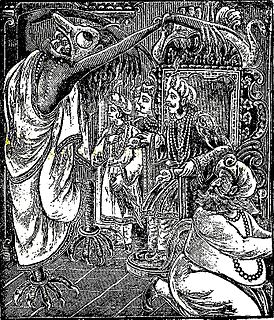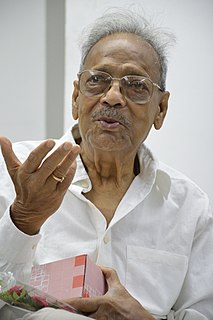Satyajit Ray series
| Goopy - Bagha | |
|---|---|
| Directed by | Satyajit Ray (Goopy Gyne Bagha Byne, Hirak Rajar Deshe) Sandip Ray (Goopy Bagha Phire Elo) |
| Produced by | Nepal Dutta, Asim Dutta (Goopy Gyne Bagha Byne, ) Government of West Bengal (Hirak Rajar Deshe, Goopy Bagha Phire Elo) |
| Written by | Satyajit Ray, Sandip Ray |
| Screenplay by | Satyajit Ray |
| Story by | Upendra Kishore Roychowdhury, Satyajit Ray |
| Starring | Tapen Chatterjee Rabi Ghosh |
| Music by | Satyajit Ray |
| Cinematography | Soumendu Roy |
| Edited by | Dulal Dutta |
Production companies | Purnima Pictures (Goopy Gyne Bagha Byne) |
| Distributed by | Government of West Bengal (Hirak Rajar Deshe, Goopy Bagha Phire Elo) |
Release date | 1 : 8 May 1969 2 : 19 December 1980 3 : 3 January 1992 |
| Country | India |
| Languages | Bengali, English |
Goopy Gyne Bagha Byne (1969)
The story revolves around Gopinath Gyne (alias Goopy, played by Tapen Chatterjee), the son of a poor grocer Kanu Kyne from a village called Amloki. Goopy wants to become a singer but has a hoarse voice. Persuaded by village elders to sing for the king, he does so and is driven out of Amloki on a donkey for waking the king with his terrible singing. Exiled into a forest, he meets Bagha (Rabi Ghosh), another exile from nearby Hortuki sent to the forest - in Bagha's case, due to playing a drum badly. They start singing and drumming, initially to scare off a roaming tiger, and in the process they attract a group of ghosts who are fascinated by their music. The king of ghosts grants them three boons:
- They can get food and clothes whenever needed by clapping their hands,
- They are given a pair of magic slippers with which they can travel anywhere,
- They gain the ability to hold people in awe (literally, their music renders people motionless) with their music.
They travel to Shundi, where a benevolent king appoints them court musicians. However the king of Halla (the long lost brother of the king of Shundi) is planning to attack Shundi, after being poisoned with magic potion that makes him evil, given to the king of Halla by his self-centered prime minister. Goopy and Bagha travel to Halla in an attempt at preventing the attack, but are captured instead. Since they have now lost their slippers, they can't escape by magic, but manage to do so instead by strategy. They arrive singing and drumming when the soldiers are about to launch their attack, capturing the king of Halla, who is returned to Shundi. The two brothers are reunited and Goopy and Bagha marry the daughters of the two kings.
Hirak Rajar Deshe (1980)
The magically musical duo of Goopy Gyne and Bagha Byne make a comeback in this sequel, where they are invited to the court of the Hirak Raja (The Diamond King), for their musical skills. They are to perform at the kingdom's Jubilee Celebrations.
Goopy and Bagha are bored with their lives as crown princes of Shundi and Halla. They are looking for a change, which comes in the form of a chance to visit Hirak Rajya (Land of Diamonds), known for its huge diamond mines. They jocundly set out for Hirak Rajya. They are unaware of the machinations of Hirok Raja (Utpal Dutt). The king is a tyrant. Diamonds and riches get pent up in his treasuries, while his subjects suffer. Those who protest are taken care of in the 'Jantarmantar', a chamber for brainwashing devised by the scientist (Santosh Dutta), who the king mocks calling as "Gobeshok Gobochondro Gyanotirtho Gyanorotno Gyanambudhi Gyanochuramoni." His ministers are mere puppets. The only enemy the king has in his land is Udayan Pandit (Soumitra Chatterjee). He is a school teacher and, more than that, he is a believer of values. The king forcefully closes his school down. Udayan flees to hide in the mountains.
Meanwhile, Goopy and Bagha are on their way to Hirok Rajya. By coincidence, they meet Udayan, who intimates them of the king's true nature. The two impress Udayan with their magical powers, who plans to use them against the tyrant. Goopy and Bagha agree. The duo then head into Hirok Rajya, where they are welcomed with grandeur. They entertain the rogue king, fooling him into believing that they think he is great. They rob the treasury (which was guarded by a tiger) using their magical music, for bribing the guards.
The king has his tricks, too. He captures Udayan and all his students, and takes them to the Jantarmantar for brainwashing. But Goopy Bagha have already reached there using their magical powers. They have also bribed the Gobeshok onto their side, with the guards. On reaching the laboratory, the king and his ministers are stunned magically by Goopy's singing and then pushed into the Brainwashing machine. After the king is brainwashed he turns to goode, he then along with the villagers pull down his own statue situated at the center of the village, and everything goes back to normal in the land of Hirak Raja.
Goopy Bagha Phire Elo (1992)

Goopy Gyne and Bagha Byne have ruled the kingdom of Shundi and are bored of royal luxuries. They want to get back to the days of adventure they had enjoyed all their lives, but age comes in the way. They leave the kingdom in search of new experiences. Finally, they reach Anandagarh and win the king's heart with their musical abilities and powers. In the court room they meet Brahmananda Acharya, who invites Goopy and Bagha to come to Anandagarh fort. When they go to his place he offers them a job to steal three valuable stones, making use of their miraculous powers gifted by Bhuter Raja (King of Ghosts). In return he promises to make them 20 years younger. They steal two rare stones with a hope to become young again.
However, in their dream the King of Ghost appears and advises them to keep off injustice. They apologise to him and return the stones to the respective owners. Brahmananda Acharya had gained immense powers, as shown when he was not rendered motionless when they sang in front of the court. But for his greed for rare and valuable stones, he was not offered immortality. It was foretold of the 12-year boy, Bikram, with divine powers, would defeat him. To prevent his death, Brahmananda Acharya had all the boys in Anandagarh, who were 12 years old and were named Bikram, kidnapped by his soldiers. He hypnotized them, making them his servants. In the end, Goopy and Bagha find out that one boy named Kanu was previously named Bikram. He was to receive divine powers at the age of 12. He, along with Goopy and Bagha, goes towards Anandagarh fort. There, as Bikram entered the fort and came close to Brahmananda Acharya, the Acharya sank beneath the ground, signifying that he had been destroyed. His valuable stones also vanished. [3]
Future
Sandip Ray wanted to make another sequel to this series. He had received many requests to make the fourth Goopy - Bagha movie. Ray said to The Times of India about the plot of fourth film: "Making a Goopy Bagha movie without Tapen and Rabi is unthinkable. The only way I can do a fourth is by taking the story forward and introducing Goopy and Bagha's sons," he said. The idea to weave a story around the next generation came from a line from the introductory song 'Mora dujonai rajar jamai in 'Hirak Rajar Deshe' — "aar ache polapan, ek khan ek khan... (we have one child each)". [4]













